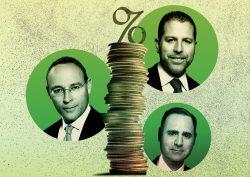When Ziel Feldman’s HFZ Capital Group paid $870 million for a site on Manhattan’s High Line to build a luxury condo project, Jonah Sonnenborn was perplexed by the then-record price, which came out to more than $1,000 per square foot.
“We bid roughly half of what HFZ acquired it for,” said Sonnenborn, the head of real estate at Access Industries. “We couldn’t make sense of that number.”
Access followed the site’s fortunes closely. And when HFZ’s problems brought the developer down and the project ran into foreclosure last year, Access jumped at the chance to claim its prize. It partnered with Steve Witkoff to acquire the nearly complete condo-and-hotel development, designed by Bjarke Ingels for $900 million. The new owners brought in Faena to operate the hotel, replacing Six Senses, resumed construction and relaunched sales.
They talk to Len and decide what they want to do and go do it.
The deal – sniffing out potential trouble in a trophy asset and swooping in when things get ugly – was vintage Access, which has thrust itself into some of the most complicated and notable residential and hotel projects across the country. Founded by Ukrainian-born billionaire Len Blavatnik, the company’s war chest and comfort with hairy deals have meant it’s had a busy year. In the Los Angeles Arts District, Access is looking to develop a 13-story, 450,000-square-foot mixed-use building with Hines. In Miami Beach, it’s building the Aman branded hotel and condo project with Vlad Doronin. In Brooklyn, Access partnered with Miki Naftali on a condo and rental project in Williamsburg on a site with complex zoning and environmental issues that recently scored $385 million in construction financing.
Read more


“Len’s history is one of jumping into complex situations and adding real value,” said Jonathan Mechanic, chair of Fried Frank’s real estate department, who has represented Access.
Blavatnik made his fortune in Russia’s “aluminum wars” and today has a net worth of about $37 billion, according to Bloomberg. The company has interests in Warner Media Group, Calpine Corporation— a natural gas and electric company— and LyondellBasell Industries, one of the world’s largest plastics, chemical and refining companies.
There’s some interesting opportunities in terms of coming in and helping a development partner actually get their project vertical.
To run the real estate business, Blavatnik tapped Sonnenborn, a former executive with Daniel Neidich’s Dune Real Estate Partners with a background in investment banking.
“I think he’s [Blavatnik] given Jonah a lot of flexibility and respects his judgment,” said Mechanic.
Access wasn’t “playing by the old rules of real estate private equity investing,” Sonnenborn said of his decision to join. The company is “able to invest anywhere in the real estate sector across the capital structure, in any amount,” he added.
Since most of its capital comes from Blavatnik, rather than outside investors, Access has fewer constraints than other real estate private equity shops and asset managers. It can stay in deals longer, too, underwriting with a 10-year horizon as compared to the traditional five-year timeline. And it can pounce on opportunities that arise: As lenders pull back from certain projects in a higher interest-rate environment, distress deals have popped up.
“There’s some interesting opportunities in terms of coming in and helping a development partner actually get their project vertical,” said Sonnenborn.
“They talk to Len and decide what they want to do and go do it,” noted Mechanic. “It’s a much quicker process than many of their competitors.”
Rather than going it alone, Access tends to partner with local developers.
In L.A. it partnered with Jeff Klein, a minority partner in the iconic Sunset Hotel, to buy out the majority partner’s stake in the property in 2017.
“Jonah was my first call,” Klein told TRD at the time, adding that the two had known each other since Sonnenborn was at Dune.
Access also teamed up with David Schwartzman to resurrect a long-stalled redevelopment of the Baldwin Hills Crenshaw Plaza in South L.A..
The splashy moves come at a time when there’s been renewed focus on Blavatnik because of his ties to Russia. A naturalized British and American citizen, Blavatnik has been scrutinized for some of his past business ventures, including his founding stake in oil giant TNK-BP, which counted Russian billionaires Viktor Vekselberg and Mikhail Fridman as co-investors. Vekselberg and Fridman have been hit by sanctions in the E.U. and U.S. Blavatnik, who has not faced sanctions, has denied any ties to Russian politics and Putin in the past. A spokesperson told Bloomberg earlier this year that less than 1 percent of Access’s assets are in any way connected to Russia.
Sonnenborn said, however, Access’s real estate deals have not been impacted.
“I think there probably are people who would like to say it’s an issue if they have their own issues, but it’s never impacted our ability to get a transaction done,” he said, noting that Access deals have landed financing from top lenders including JPMorgan, Bank of America and Blackstone Group.
The company is now looking for new opportunities in the public markets, which could include buying shares of REITs or taking companies private. And it could put more money to work in sectors such as housing or logistics, Sonnenborn said.
Whatever Access does next, one thing is for sure: it will not be simple.
“Everything that I think of with them is complicated,” said Mechanic. “They are not buying plain vanilla apartments in Atlanta. They are buying things that are complicated and things that have risk and, therefore, getting risk-adjusted returns.”
